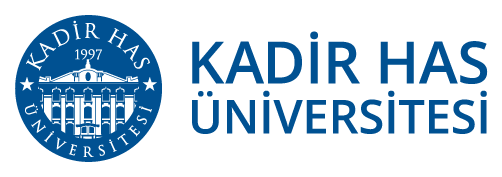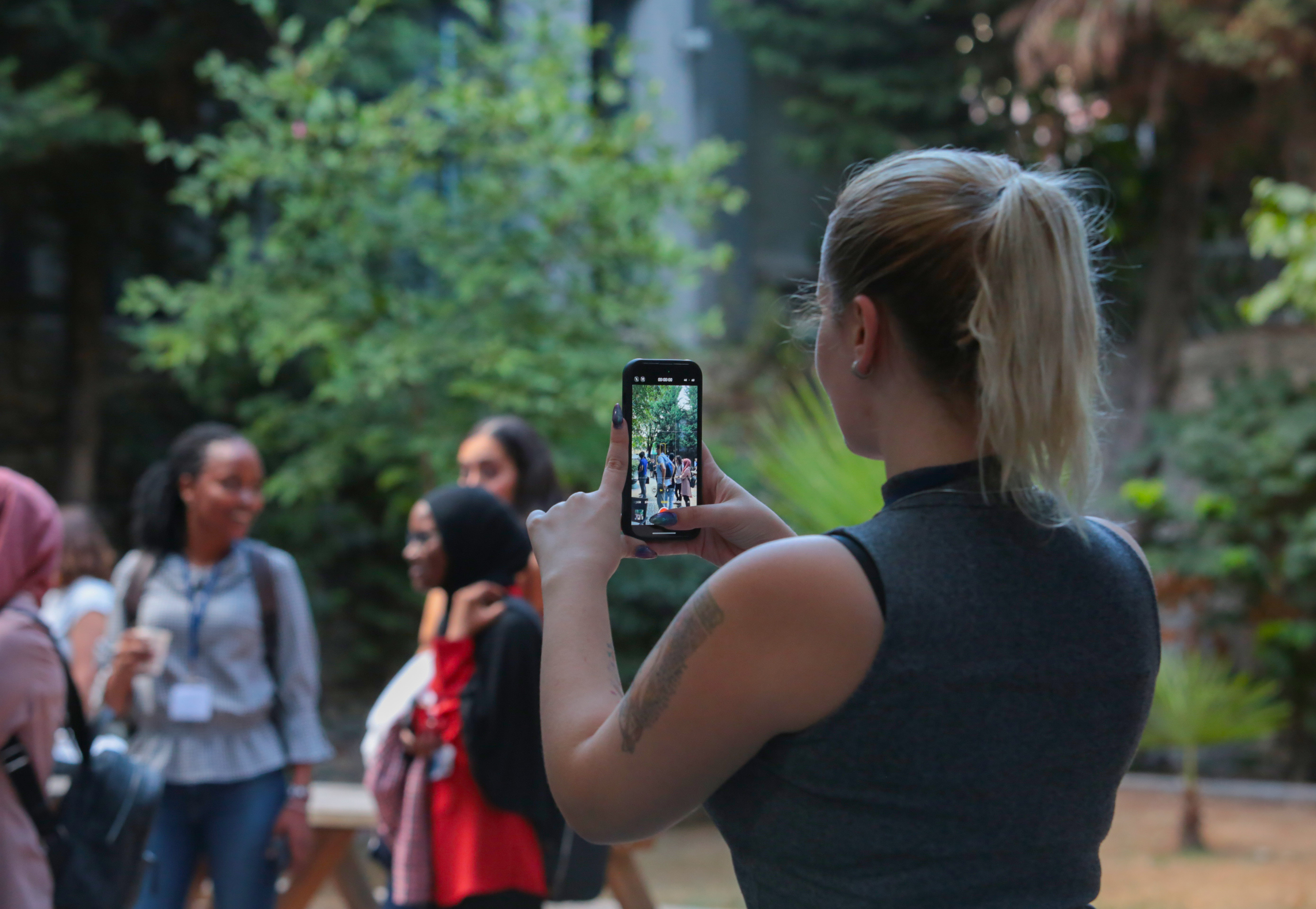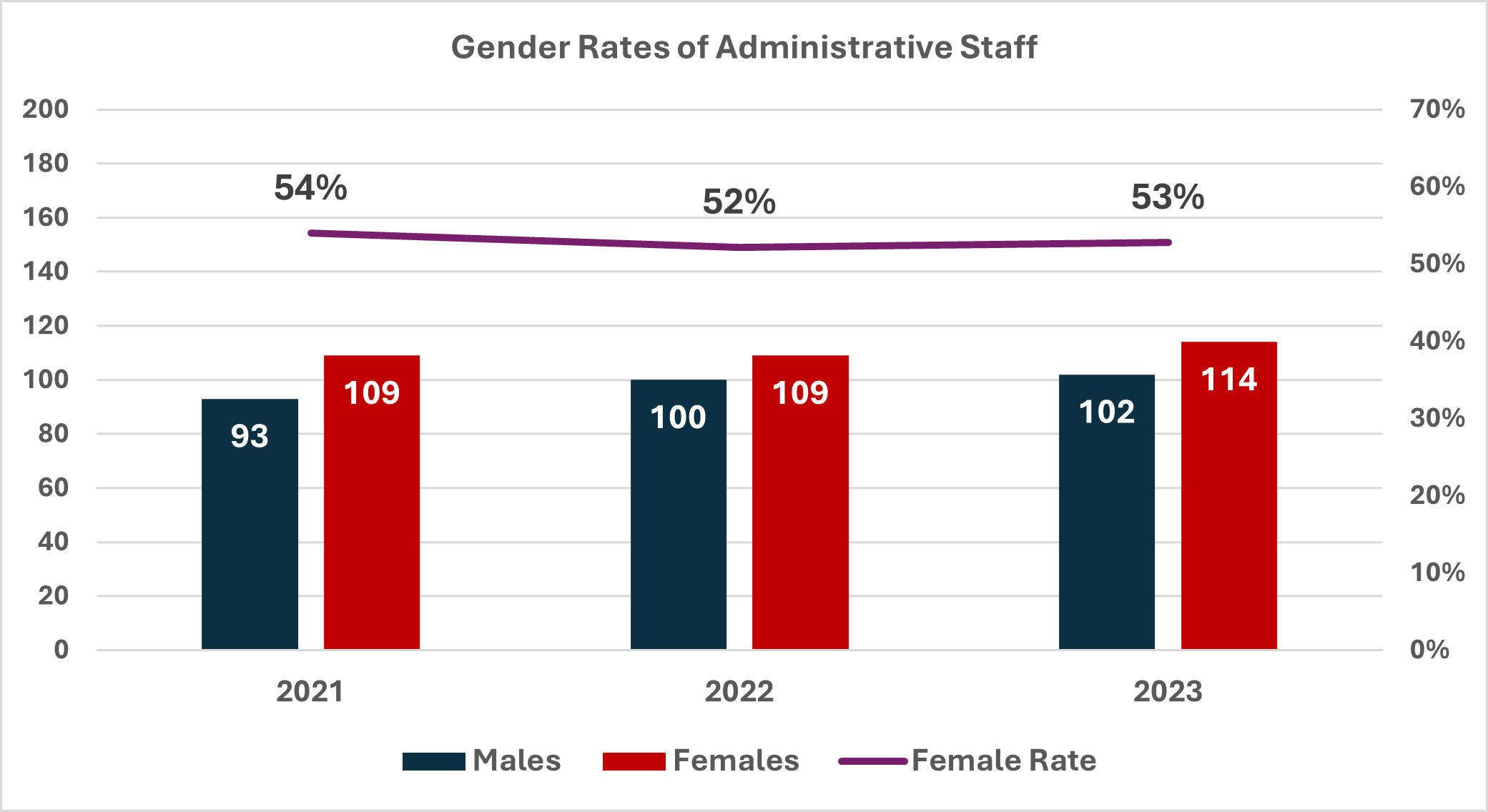KADIR HAS UNIVERSITY GENDER STATISTICS
Kadir Has University is an organization that is not only pledging in respect of gender equality but also taking concrete steps in this context accordingly. The extent of our loyalty to the goal of the UN for “Gender Equality” covers a series of areas starting from education to research and projects to awards.
Kadir Has University offers various courses intended to enhance the awareness of gender equality and create consciousness accordingly. There are postgraduate programs concerning Women’s Studies and also an application and research center in this respect. The courses offered with a point of view of gender equality provide the students with a chance to question gender roles and enhance awareness of inequalities.
Our University provides extensive support to the research carried out in the field of gender equality. The study conducted at different faculties and centers increases the level of knowledge with respect to gender equality. In addition, these research programs are published in national and international magazines as a scientific contribution to the context of gender equality. Our University plays an active role in different platforms in the field of gender equality. Accordingly, we are members of national and international gender quality networks and organizations. These positions as a member provide us with essential facilities for sharing knowledge and cooperation.
KADIR HAS UNIVERSITY GRADUATE / ALUMNI STATISTICS WITH GENDER DIVISIONS

From 2016 to the present, Kadir Has University has shown a significant increase in the number of female graduates, reflecting our commitment to gender balance and inclusivity in higher education. In 2016, the university saw nearly equal numbers of female and male graduates, with 306 female and 305 male graduates. This close balance began to shift positively in favor of female representation in the following years.
By 2017, the number of female graduates had risen to 404 compared to 337 male graduates, marking the start of a steady upward trend. This increase continued into 2018, where female graduates numbered 464, significantly outpacing the 380 male graduates. This upward trajectory underscores our dedication to fostering an academic environment where female students are encouraged to excel.
In 2019, female graduate students made up 52.87% of the graduate population, with 387 female students compared to 345 male students. This year marked the beginning of a new trend, where women consistently represented over half of the graduate student body. Despite fluctuations in numbers, female graduates continued to outnumber their male counterparts, with 452 female graduates in 2020 and 416 in 2021, showing a steady and resilient representation.
By 2022, although there was a slight decline in absolute numbers, female graduates still held a majority at 399 compared to 286 male graduates. This sustained majority of female graduates reflects the university’s ongoing efforts to support and empower women in academia.
The trend reaches a peak in the 2023-2024 academic year, where 500 female graduate students now represent 58.34% of the graduate population. This growth highlights Kadir Has University's strategic initiatives to create an inclusive academic environment where women are encouraged to pursue advanced studies and are prepared for leadership roles in their respective fields. Our consistent upward trend in female graduates over the years is a testament to our university’s dedication to gender equality, fostering a culture where women are equally represented, supported, and inspired to achieve their academic and professional goals.
| Year | Female Students | Male Students |
| 2016 | 306 | 305 |
| 2017 | 404 | 337 |
| 2018 | 464 | 380 |
| 2019 | 387 | 345 |
| 2020 | 452 | 355 |
| 2021 | 416 | 358 |
| 2022 | 399 | 286 |
| 2023 | 500 | 357 |
| Number of Graduates / Alumnis by Gender (Including Double Major Students) Annual Faculty Comparisions - 2023 | ||
| Faculty | Female Students | Male Students |
| Faculty of Economics, Administrative and Social Sciences | 143 | 110 |
| Faculty of Engineering and Natural Sciences | 111 | 134 |
| Faculty of Law | 86 | 53 |
| Faculty of Communication | 75 | 40 |
| Faculty of Art and Design | 85 | 20 |
KADIR HAS UNIVERSITY STUDENTS STATISTICS WITH GENDER DIVISIONS
Kadir Has University has consistently maintained an impressive track record when it comes to the representation of female students, consistently exceeding the national average in Turkey. The remarkable female enrollment performance of Kadir Has University is evidence of the university's overarching goal of giving everyone, regardless of gender, access to and success in higher education. It eventually plays a crucial role in creating a more inclusive and varied academic landscape in Turkey by reiterating the university's commitment to advancing women in education and society at large.
You can find below the gender statistics of our students.
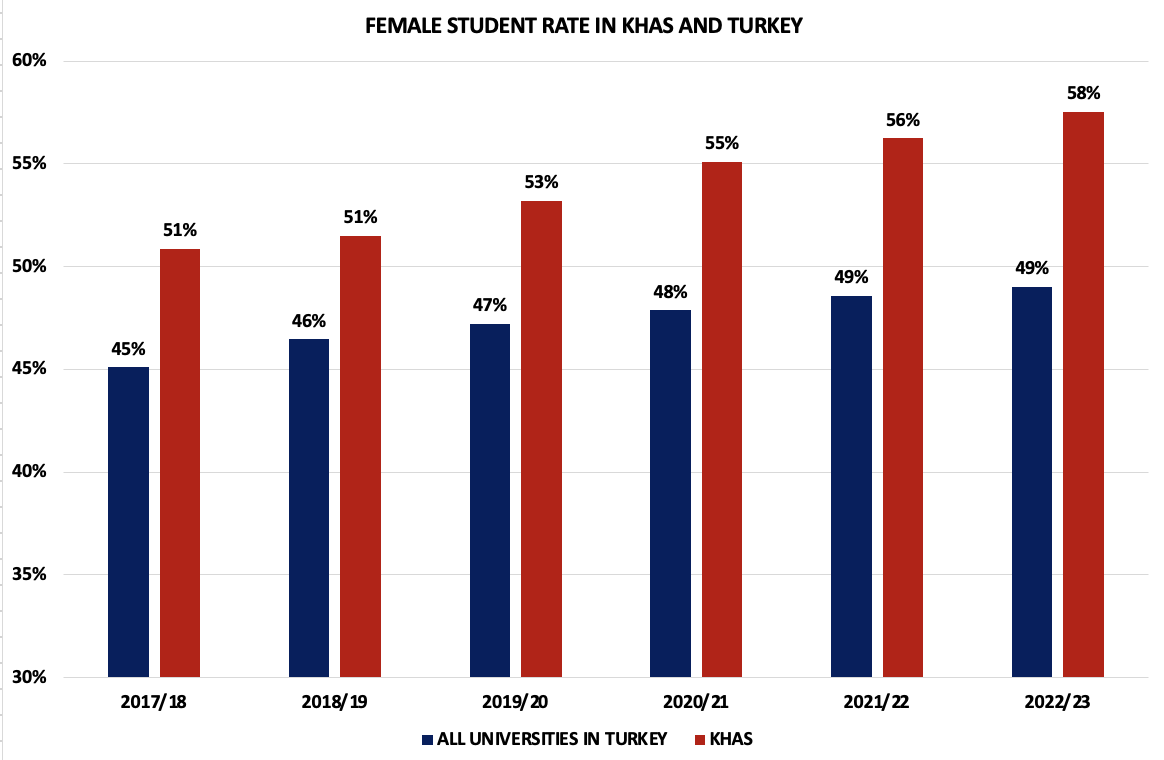
Undergraduate Scholars Supported Within a Project
Kadir Has University is deeply committed to fostering gender equality and promoting the participation of women in research and development (R&D). Through externally funded Research and R&D projects, the university provides essential financial support to undergraduate students, offering full living stipends for a minimum of six months. These projects, funded by sources outside the university, enable students to immerse themselves in hands-on research experiences that are critical for their academic and professional growth.
Currently, 26 undergraduate students benefit from this support, with a notable gender distribution: 16 female students (62%) and 12 male students (38%), which demonstrates our proactive approach to creating an inclusive environment that encourages women.
The undergraduate students supported our externally funded research projects come from a wide range of disciplines, reflecting our interdisciplinary approach to education and research. These students are pursuing degrees in fields such as Computer Engineering, Psychology, Law, International Trade and Finance, Economics, Mechatronics Engineering, Industrial Design, and Visual Communication Design.
Additionally, students from the Faculty of Communication, studying Radio, Television, and Cinema, as well as those in Management Information Systems and Political Science and International Relations, are also benefiting from these opportunities. The diversity of departments involved, from Architecture to Core Programs, highlights the broad spectrum of academic interests that Kadir Has University supports, enabling students across disciplines to engage in meaningful research experiences.
By offering this level of support across such a variety of fields, we ensure that students from STEM, social sciences, arts, and design all have the chance to contribute to innovative projects, promoting a multidisciplinary approach to problem-solving and academic development. This diversity further underscores our commitment to preparing well-rounded graduates equipped with the skills and knowledge necessary for future leadership in their respective fields.
Erasmus+ Student Mobility Program
|
Academic Department |
Female |
Male |
|
Postgraduate |
10 |
3 |
|
Business |
4 |
2 |
|
International Trade and Finance |
1 |
2 |
|
Economy |
1 |
2 |
|
Political Science and International Relations |
1 |
1 |
|
Psychology |
1 |
|
|
Management Information Systems |
6 |
3 |
|
New Media |
3 |
2 |
|
Visual Communication Design |
4 |
|
|
Public Relations and Publicity |
2 |
|
|
Radio, Television and Cinema |
|
1 |
|
Advertising |
3 |
|
|
Computer Engineering |
|
4 |
|
Electrical and Electronics Engineering |
|
3 |
|
Industrial Engineering |
5 |
1 |
|
Civil Engineering |
|
1 |
|
Mechatronics Engineering |
|
2 |
|
Industrial Design |
7 |
|
|
Interior Architecture and Environmental Design |
5 |
2 |
|
Architecture |
1 |
|
|
Theater |
5 |
|
|
TOTAL |
59 |
29 |
Scholarships
As part of Kadir Has University’s Women’s Access Scheme, the White Doves Scholarship Program empowers young women to pursue their studies with confidence, contributing to a more inclusive and diverse academic community.

Mentoring
As part of Kadir Has University’s Women’s Access Scheme, the KHAS Mentor-Mentee Program offers female students the opportunity to benefit from the experiences of successful female alumni who are established professionals. Coordinated by the Career Office, this mentorship program pairs accomplished female graduates with current female KHAS students, aligning them by academic year to ensure relevance and relatability.
Through this program, mentors answer mentees' questions about their fields of study, provide insights into industry practices, and inspire them with advice on navigating professional life. Female mentors share personal experiences, offering guidance on balancing student responsibilities with career goals and providing a roadmap for entering the workforce. Before the program begins, online training sessions are conducted by the Career Office for both mentors and mentees, ensuring all participants are well-prepared for a productive mentoring experience.
In 2023, 27 female mentors and 44 female mentees participated in the program, resulting in support and guidance for a total of 68 young women —representing over 10% more than the total number of mentees, highlighting a strong emphasis on supporting young women through mentorship. This mentorship initiative is a cornerstone of the Women’s Access Scheme at Kadir Has University, empowering young women with the skills, knowledge, and confidence needed to excel in their careers.
KADIR HAS UNIVERSITY ACADEMICS STATISTICS WITH GENDER DIVISIONS
You can find below the gender statistics of our faculty members.
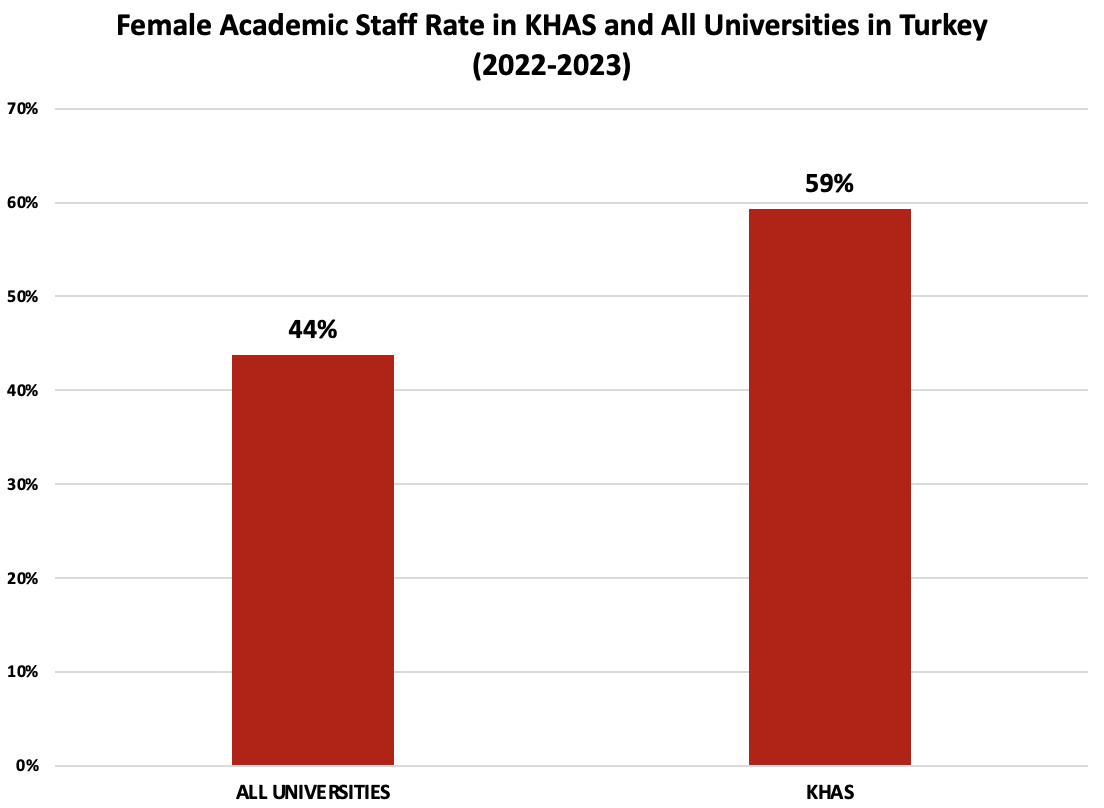
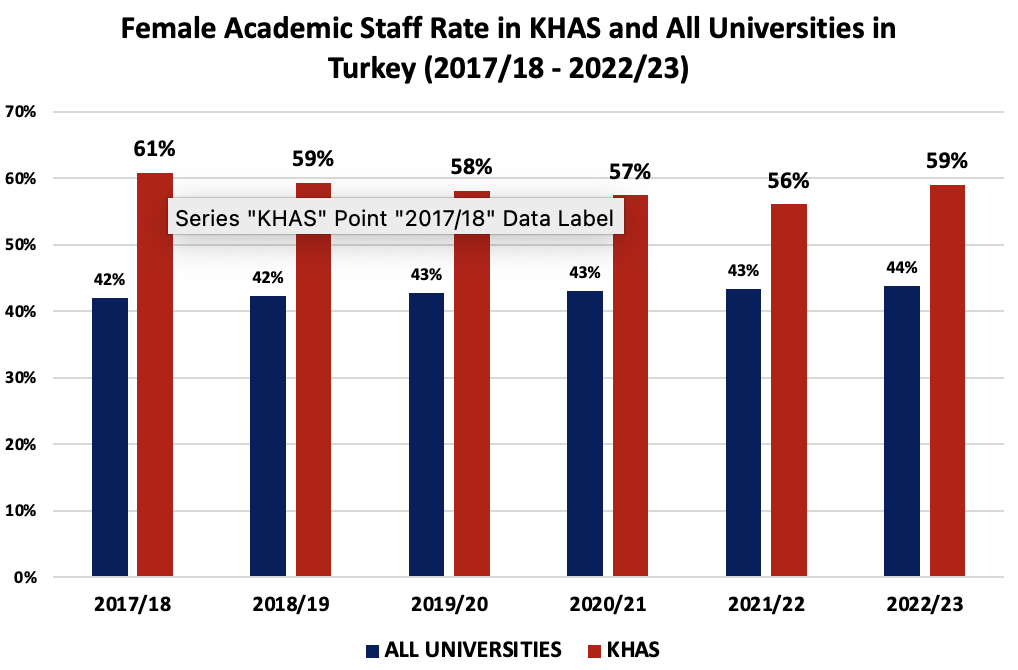
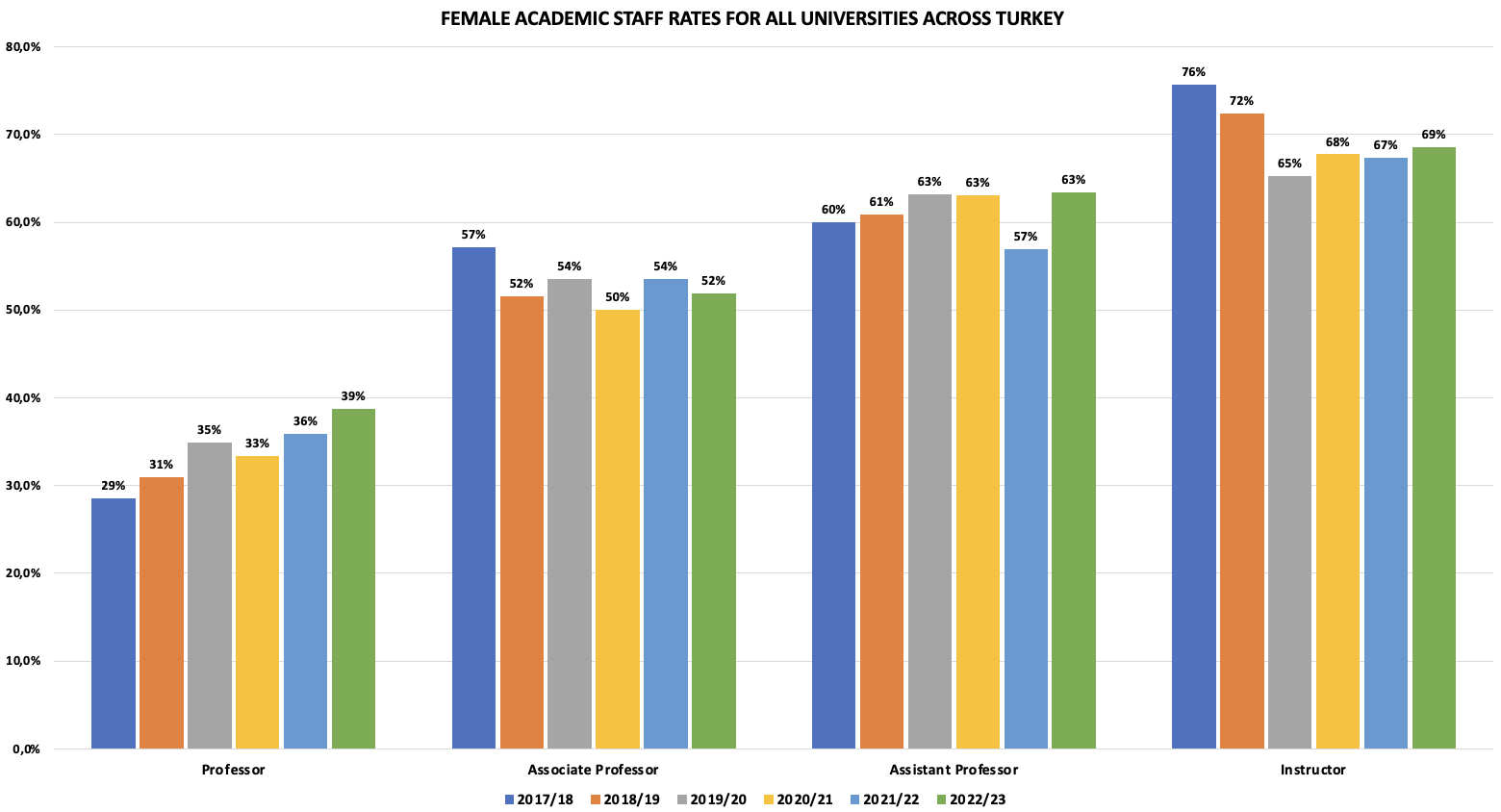
Administrative Staff Gender Data
- In 2021, 54% of the administrative staff were female (109 females, 93 males) out of a total of 202 employees.
- In 2022, 52% of the staff were female (109 females, 100 males) out of 209 employees.
- In 2023, 53% of the staff were female (114 females, 102 males) out of 216 employees.
-
Management Training: 57% female participation, with 54 women and 40 men out of a total of 94 participants.
-
Service Improvement Training: 38% female participation, with 5 women and 8 men out of a total of 13 participants.
-
Orientation Training: 66% female participation, with 27 women and 14 men out of 41 participants.
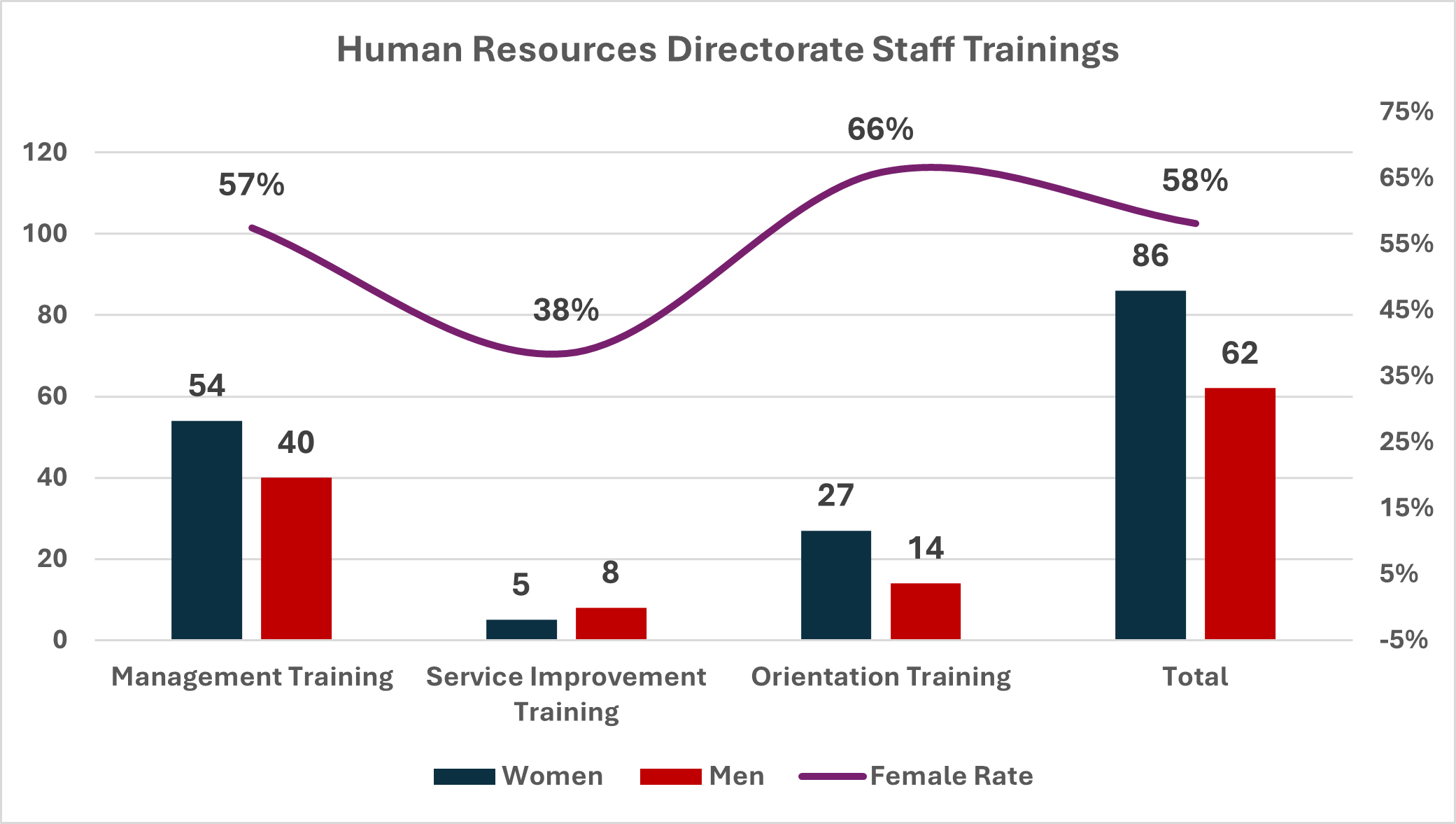

Erasmus+ Staff Mobility Program
Kadir Has University is deeply committed to gender equality not only among its students but also within its staff. In 2023, the university supported 15 staff members—8 academic and 7 administrative—through the Erasmus program, sending them abroad for professional development and collaboration. Of these, 10 were women, representing 67%, while 5 were men.
This strong female representation across both academic and administrative roles underscores the university’s ongoing efforts to foster inclusivity and gender balance within the workplace. By empowering women to engage in international opportunities, Kadir Has University ensures that its commitment to diversity extends beyond the classroom, creating a more equitable environment for leadership and innovation. The university’s dedication to providing these opportunities reflects a broader mission to cultivate inclusive global networks where women’s voices are equally heard and valued.
